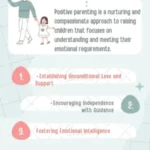Parenting skills form the foundation of a child’s upbringing, significantly influencing their development. In this exploration, we’ll delve into the multifaceted world of effective parenting, understanding the crucial skills that contribute to a healthy parent-child relationship.
Effective Communication
At the core of successful parenting lies effective communication. This involves not just talking to your child but truly engaging in open dialogue. Active listening techniques play a pivotal role, ensuring your child feels heard and valued.
Setting Boundaries and Consistency
Establishing clear boundaries and maintaining consistency in enforcing rules create a structured environment for children. This fosters a sense of security and helps them understand the consequences of their actions.
Emotional Intelligence in Parenting
Emotional intelligence in parenting involves understanding and managing emotions effectively. Teaching children how to express their feelings in a healthy manner contributes to their emotional well-being.
Positive Reinforcement
Positive reinforcement is a powerful tool in effective parenting. Encouraging good behavior through praise and rewards builds a positive parent-child relationship, reinforcing desirable conduct.
Problem-Solving Skills
Nurturing problem-solving skills in children is essential. Teaching them to analyze situations, think critically, and find solutions independently prepares them for challenges they may face.
Adaptability and Flexibility
Parenting often throws unexpected challenges. Adaptability and flexibility in your approach allow you to navigate these challenges with grace, adjusting your parenting style as needed.
Empathy and Understanding
Cultivating empathy and understanding involves putting yourself in your child’s shoes. Tailoring your responses to their individual needs creates a supportive and understanding environment.
Leading by Example
Parents are the primary role models for their children. Leading by example involves modeling the behavior and values you wish to instill in your child, creating a foundation for their moral development.
Supporting Independence
Supporting independence means fostering autonomy in your child. Allowing them age-appropriate responsibilities encourages a sense of self-reliance and confidence.
Staying Calm Under Pressure
Parenting can be stressful, but the ability to stay calm under pressure is crucial. Effective coping mechanisms contribute to a healthier parent-child dynamic.
Teaching Responsibility
Assigning chores and tasks is a way of teaching responsibility. This helps children understand the importance of contributing to the household and being accountable for their actions.
Cultivating a Positive Environment
Creating a positive environment at home significantly impacts a child’s development. A nurturing atmosphere fosters a sense of security, promoting healthy emotional growth.
Encouraging Lifelong Learning
Encouraging lifelong learning involves fostering a love for acquiring knowledge. Instilling curiosity in children sets the stage for a continuous journey of exploration and discovery.
Conclusion
In conclusion, unlocking effective parenting involves mastering a range of skills, from communication and setting boundaries to leading by example and encouraging lifelong learning. This ongoing journey is a dynamic process, adapting to the ever-changing needs of both parents and children.
Frequently Asked Questions (FAQs)
- How can I improve communication with my child?
- Engage in active listening, express yourself clearly, and create a safe space for open dialogue.
- Is positive reinforcement always effective in parenting?
- While generally effective, it’s crucial to balance positive reinforcement with appropriate consequences for undesirable behavior.
- What if my child struggles with problem-solving skills?
- Provide guidance and practice, encouraging them to think critically and offering support when needed.
- How can I stay calm when faced with parenting challenges?
- Practice self-care, utilize stress-management techniques, and seek support from your partner or a support network.
- At what age should I start encouraging responsibility in my child?
- Start with age-appropriate tasks early on, gradually increasing responsibility as your child grows.
Read also: The Ultimate Guide to Triple P- Positive Parenting Programs





